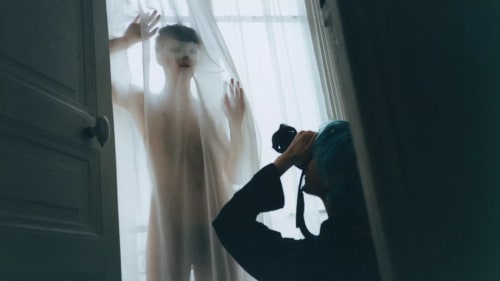After his first book gave a voice to young Russian men navigating their sexuality in a repressive environment, Vlad Zorin now turns his erotic lens on France.
Two years ago, Russian-born photographer Vlad Zorin hitchhiked 1,000 km across France, meeting various men from all walks of life and documenting their stories of love and sexuality through interviews and intimate portraits.
His travels culminated in "With Love From France", his latest project which forms a new photography book and an exhibition airing at the Upsilon Gallery in London this September.
The body of work comes on the heels of his escape from Russia in 2022. Zorin fled from his homeland, fearing for his safety after the backlash from his controversial anti-war exhibition, 'Soft Power', which featured provocative photos and videos of men masturbating with plastic toy tanks. It was held just a stone's throw from the Kremlin.
His latest project follows on from his seminal "With Love From Russia", which explored similar themes of male vulnerability, sensuality and sexuality in his home country.
"I couldn’t speak openly about myself, so I decided to interview other men. By working with people and listening to their life stories, I dealt with my own issues that I hadn’t previously allowed myself to consider" Zorin tells Euronews Culture.
We delved deeper into the new book with Zorin, to discuss the people he met along the way and the impact he hopes his work will have on audiences.
Euronews Culture: Tell us more about With Love From France.
Vlad Zorin: With Love From France is a continuation of my first project With Love From Russia, where I explored the sexuality of Russian men. After fleeing Russia and finding refuge in France, I wanted to better understand and explore the mentality of my new home. I traveled through different regions of France, meeting people, interviewing them, and photographing them while they wore white masks.
The essence of the project is to show that men can be tender and emotional without judgment. For me, it’s crucial to convey that men are also human and have their own feelings.
The project also stemmed from a personal interest. I couldn’t speak openly about myself, so I decided to interview other men. By working with people and listening to their life stories, I dealt with my own issues that I hadn’t previously not allowed myself to consider.
What does the mask represent?
The mask symbolises protection and allows people to speak openly about very important matters. It represents hope for a future where masks won’t be necessary.
How did you go about finding your subjects for this project?
The most compelling subjects were those I met in everyday settings. I approached people in the subway and cafes, introduced myself, and invited them to share their experiences of love and their first experiences.
I also made a profile on Tinder where I put out a call for potential subjects and reached out to others via Instagram. But the most striking encounters were on the street, as they allowed me to capture a a snapshot of different people from all walks of life.
What were some of the most surprising or emotional moments you encountered during the project?
I photographed a man who weighed about 150 kilograms. He was very nervous when he arrived, but after the shoot, I saw his eyes light up with happiness. He finally felt accepted and was able to express his emotions without judgement. It was truly wonderful.
How does this new project differ and how do you think the cultural context of France, compared to Russia, influenced the way your subjects expressed their identities?
In my previous project, I focused more on younger men. This new project, however, involved a diverse range of people. It took on a more social aspect for me. The youngest participant was 18, and the oldest was 75.
I was surprised to discover that, although I thought that France would be more liberal and better in some aspects, I found many topics here are still very taboo. For instance, I met a young man who was disowned by his father when he came out as gay.
I thought such issues only existed in Russia, but I realised there’s still a lot of work to be done in France, in regards to issues like racism, homophobia and AIDS stigma. There is still a long way to go.
How do you hope your work will contribute to the conversations around these topics?
It was very important for me to show, starting with my first book, that many young people and their parents might make fewer mistakes if they knew earlier about these issues. Many topics are still taboo, and when confronted with them, people often don't know how to react or behave.
You see this through candid interviews and the experiences of 50 different men of varying ages, residences, and sexual orientations in France. It helps you compare and reflect on these issues. It’s a journey towards understanding oneself, learning about topics that are still systematically avoided but that everyone encounters. It’s crucial to discuss these matters.
I continue to receive thank-you notes from readers all over the world. They tell me that my first book has helped them understand themselves better and accept their sexuality. I was particularly moved by letters from parents, grateful for answering their burning questions and enabling them to speak the same language with their children.
What’s next for you as an artist?
I plan to explore country by country, moving on to platforms like America, Africa, and choosing countries with significant systematic issues to address these topics. I'm hoping that in the future, we won’t need masks. For now, the mask serves as a metaphor and filter through which men can be honest and tender.
Vlad Zorin's upcoming exhibition at the Upsilon Gallery London runs from 20 November to 14 December 2024.

